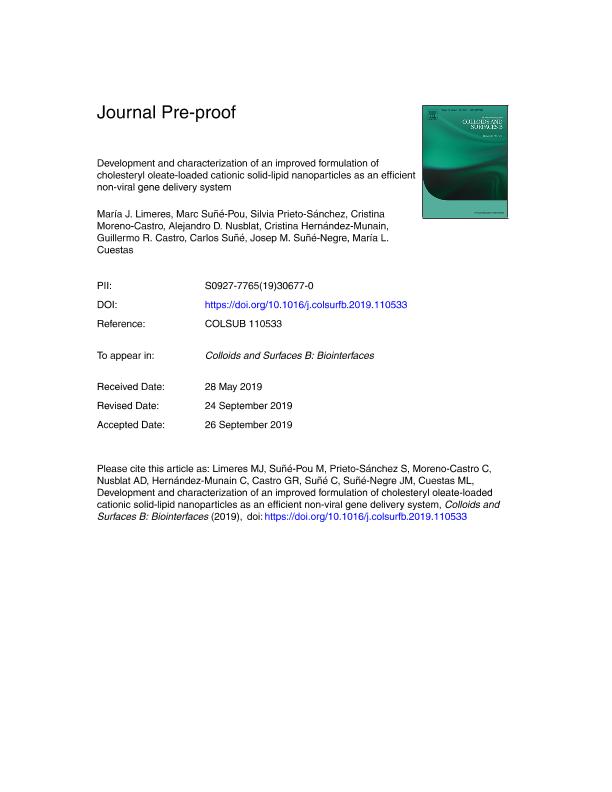Artículo
Development and characterization of an improved formulation of cholesteryl oleate-loaded cationic solid-lipid nanoparticles as an efficient non-viral gene delivery system
Limeres, María José ; Suñé Pou, Marc; Prieto Sanchez, Silvia; Moreno Castro, Cristina; Nusblat, Alejandro David
; Suñé Pou, Marc; Prieto Sanchez, Silvia; Moreno Castro, Cristina; Nusblat, Alejandro David ; Hernandez Munain, Cristina; Castro, Guillermo Raul
; Hernandez Munain, Cristina; Castro, Guillermo Raul ; Suñe, Carlos; Suñé nNegre, Josep M.; Cuestas, María Luján
; Suñe, Carlos; Suñé nNegre, Josep M.; Cuestas, María Luján
 ; Suñé Pou, Marc; Prieto Sanchez, Silvia; Moreno Castro, Cristina; Nusblat, Alejandro David
; Suñé Pou, Marc; Prieto Sanchez, Silvia; Moreno Castro, Cristina; Nusblat, Alejandro David ; Hernandez Munain, Cristina; Castro, Guillermo Raul
; Hernandez Munain, Cristina; Castro, Guillermo Raul ; Suñe, Carlos; Suñé nNegre, Josep M.; Cuestas, María Luján
; Suñe, Carlos; Suñé nNegre, Josep M.; Cuestas, María Luján
Fecha de publicación:
09/2019
Editorial:
Elsevier Science
Revista:
Colloids and Surfaces B: Biointerfaces
ISSN:
0927-7765
Idioma:
Inglés
Tipo de recurso:
Artículo publicado
Clasificación temática:
Resumen
Nanoparticle-mediated plasmid delivery is considered a useful tool to introduce foreign DNA into the cells for the purpose of DNA vaccination and/or gene therapy. Cationic solid-lipid nanoparticles (cSLNs) are considered one of the most promising non-viral vectors for nucleic acid delivery. Based on the idea that the optimization of the components is required to improve transfection efficiency, the present study aimed to formulate and characterize cholesteryl oleate-containing solid-lipid nanoparticles (CO-SLNs) incorporating protamine (P) to condense DNA to produce P:DNA:CO-SLN complexes as non-viral vectors for gene delivery with reduced cytotoxicity and high cellular uptake efficiency. For this purpose, CO-SLNs were used to prepare DNA complexes with and without protamine as DNA condenser and nuclear transfer enhancer. The main physicochemical characteristics, binding capabilities, cytotoxicity and cellular uptake of these novel CO-SLNs were analyzed. Positively charged spherical P:DNA:CO-SLN complexes with a particle size ranging from 330.1 ± 14.8 nm to 347.0 ± 18.5 nm were obtained. Positive results were obtained in the DNase I protection assay with a protective effect of the genetic material and 100% loading efficiency was achieved at a P:DNA:CO-SLN ratio of 2:1:7. Transfection studies in human embryonic kidney (HEK293T) cells showed the versatility of adding protamine to efficiently transfect cells, widening the potential applications of CO-SLN-based vectors, since the incorporation of protamine induced almost a 200-fold increase in the transfection capacity of CO-SLNs without toxicity. These results indicate that CO-SLNs with protamine are a safe and effective platform for non-viral nucleic acid delivery.
Archivos asociados
Licencia
Identificadores
Colecciones
Articulos(CINDEFI)
Articulos de CENT.DE INV EN FERMENTACIONES INDUSTRIALES (I)
Articulos de CENT.DE INV EN FERMENTACIONES INDUSTRIALES (I)
Articulos(IMPAM)
Articulos de INSTITUTO DE INVESTIGACIONES EN MICROBIOLOGIA Y PARASITOLOGIA MEDICA
Articulos de INSTITUTO DE INVESTIGACIONES EN MICROBIOLOGIA Y PARASITOLOGIA MEDICA
Articulos(NANOBIOTEC)
Articulos de INSTITUTO DE NANOBIOTECNOLOGIA
Articulos de INSTITUTO DE NANOBIOTECNOLOGIA
Citación
Limeres, María José; Suñé Pou, Marc; Prieto Sanchez, Silvia; Moreno Castro, Cristina; Nusblat, Alejandro David; et al.; Development and characterization of an improved formulation of cholesteryl oleate-loaded cationic solid-lipid nanoparticles as an efficient non-viral gene delivery system; Elsevier Science; Colloids and Surfaces B: Biointerfaces; 184; 9-2019; 1-27
Compartir
Altmétricas



